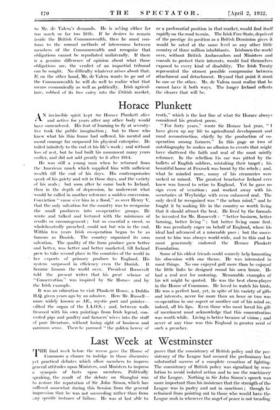Horace Plunkett
AN invincible spirit kept Sir Horace Plunkett alive and active fiw years after any other body would have surrendered. His feat of learning to fly at seventy- live took the public imagination ; • but to those who knew what his thin frame had suffered, his -mental and moral courage far surpassed his physical enterprise. He toiled infinitely to the end :It his life's work ; and without loss of zest, but he had built his monument many years earlier, and did not acid greatly to it after 1014.
He was still a young nuns when he returned from the American ranch which supplied him with sufficient wealth till the end of his days. His contemporaries speak of his gaiety and wit in those days, and the variety of his wads; but soon after he cause back to Ireland, then in the depth of depression, he underwent what 'would be called in another reference a sudden conversion. Conviction " came o'er him in a flood," as over Henry V, that the only salvation for time country. .was to reorganize the small producers into co-operative groups. He wrote and talked and lectured with the minimum of results or encouragement ; but so essential a creed, so wholeheartedly preached, could not but win in the end. Within ten years Irish co-operation began to be as famous as Danish. The country organized its own salvation. The quality of the farm produce grew better and better, was better and better marketed, till Ireland grew to take second place in the countries of the world in her exports of primary produce to England. His system surpassed in efficiency even the Danish. It became famous the world over.. President Roosevelt told the present writer that his great scheme of "Conservation" was inspired by Sir Horace and by -the Irish example.
It was an education to visit Plunkett House, a Dublin H.Q. given years ago by an admirer. Here Mr. Russell— more widely known as AE., mystic poet and painter- --- edited the organ of the ; and, between walls frescoed with his own paintings from Irish legend, con- verted pigs and poultry and farmers' wives into the stuff of pure literature, without losing sight of business and common sense. There he pursued " the golden heresy of truth," which is the last line of what Sir Horace always considered his greatest .poem.
" For forty years," wrote Sir Horace last year, "
have given up my life to agricultural development. and -rural reconstruction, chiefly by the production of co-
operation among farmers." 'In this page or two of autobiography he makes no allusion to events that might have shattered the faith and zeal of the most saintly reformer. In the rebellion his car was pitted by the bullets of English soldiers, mistaking their target ; his • beautiful house at Foxrock was burnt by the rebels ; and, what he minded more, many of his creameries were sacked or ruined. The greatest benefactor Ireland ever knew was forced to retire to England. Yet he gave no sign even of vexation ; and worked away with his secretaries at Weybridgc with even enhanced zeal. This only devil he recognized was " the urban mind," and he fought it by making life in the country so worth living that it .should attract the best. He lived by the formula he invented for Mr. Roosevelt : " better business,. better farming, better living " ; but better living came :first.
He was peculiarly eager on behalf of England, where his ideal had advanced at a miserable pace ; but the move- ment to him was always world-wide, and to this end he most generously endowed the Horace Plunkett.
Foundation. - Sonic of his oldest friends could scarcely help lamenting his obsession with one theme. He was interested in most things. No'one enjoyed golf more than he enjoyed the little links he designed round his own hciule. He had a real zest for motoring. Memorable examples of -his wit might be quoted. He was the best chess-player in the House of Commons. He loved to watch his birds.
• He was a perfect host, yet, in spite of his variety of gifts and interests, never for more than an hour or two was
• co-operation in one aspect or another out of his mind or, indeed, off his-lips. Even those who most loved his gift of merriment must acknowledge that this concentration was worth while. Living is better.because of vision iand never at any time was this England in greater need of such a preacher.
































 Previous page
Previous page